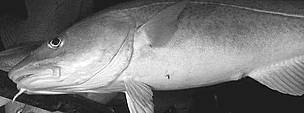WWF: voluntary krill no-fishing zones good for Antarctica, next step must be more protected areas
On July 9, WWF welcomed the announcement of a voluntary krill fishery closure along the Antarctic Peninsula by five fishing companies who make up the Association of Responsible Krill Harvesting companies (ARK) – Aker BioMarine (Norway), Pesca Chile (Chile), Insung (South Korea), Rimfrost (Norway) and China National Fisheries Corporation (China) – in Cambridge, United Kingdom.

A Cod species, Gadus morhua, feeding on krill near an active ROV vehicle at 400m depth in the North East Atlantic Ocean.
Aker BioMarine, the world’s largest krill fishing company, also says it will support the creation of marine sanctuaries in Antarctica through the establishment of Marine Protected Areas (MPAs) in coming years.
“WWF welcomes the initiative by Aker BioMarine and other ARK members to voluntarily commit to protecting Antarctica and its extraordinary wildlife,” said Chris Johnson, Senior Manager of WWF’s Antarctic Program.
Antarctic MPAs can only be created with the agreement of all 25 members of the Commission for the Conservation of Antarctic Marine Living Resources (CCAMLR).
The Commission’s purpose is to preserve Antarctica’s marine life and its Secretariat is in Hobart, Tasmania.
“A comprehensive and effective network of marine protected areas surrounding the continent – which must include no-take marine sanctuaries – is essential for safeguarding biodiversity and improving sustainable fisheries,” Mr Johnson said.
“The accelerating impact of humanity on fragile ocean ecosystems, including from climate change, makes this commitment to Antarctic protection all the more timely.
“WWF hopes that Commission members build on this important commitment from a major industry player and come together to create more MPAs,” he said.
WWF partnered with Aker BioMarine (2007 - 2017) providing technical and strategic advice on setting higher standards for sustainability in the Southern Ocean and to ensure better protection for fragile Antarctic ecosystems.
During this time, Aker BioMarine earned independent certification by the Marine Stewardship Council, invested in new technology which significantly reduced bycatch, established a research fund for the Southern Ocean, and started ARK (Association of Responsible Krill harvesting companies) to lift industry standards.
“We are very glad that all members of ARK decided to join this initiative, an industry organization established as a response to feedback from WWF. Their feedback has been vital for us to build sustainable best practices, and we look forward to working together with them on support for a large-scale network of marine protected areas in the Antarctic,” said Kristine Hartmann, EVP Transformation Aker BioMarine.
Currently WWF is calling for 30% of the Southern Ocean to be protected by 2030. To achieve this WWF partners with members of the Antarctic and Southern Ocean Coalition that include such NGOs such as Greenpeace and Pew Charitable Trusts.
WWF has over 5 million supporters, a global Network active in more than 100 countries, and has been campaigning to protect Antarctica for over 30 years.
Source: World Wildlife Fund
- 367 reads
Human Rights
Fostering a More Humane World: The 28th Eurasian Economic Summi

Conscience, Hope, and Action: Keys to Global Peace and Sustainability

Ringing FOWPAL’s Peace Bell for the World:Nobel Peace Prize Laureates’ Visions and Actions

Protecting the World’s Cultural Diversity for a Sustainable Future

Puppet Show I International Friendship Day 2020

